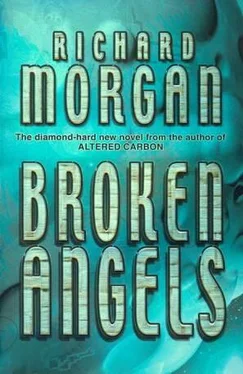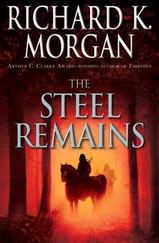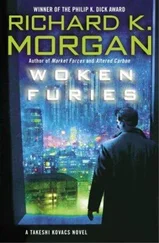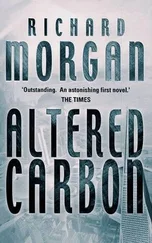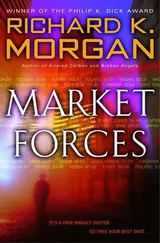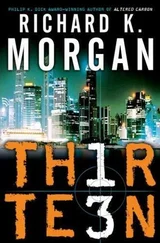“Fine.”
The clerk propped himself to his feet, disappointed, and went to fetch the reader from a room in back.
“Cash,” murmured Wardani. “We should have thought of that.”
Schneider shrugged. “Can’t think of everything. When was the last time you paid for something without a chip?”
She shook her head. I thought back briefly to a time three decades gone and a place light years distant where for a while I’d used tactile currency instead of credit. I’d even got used to the quaint plastified notes with their ornate designs and holographic panels. But that was on Earth, and Earth is a place straight out of a pre-colonial period experia flick. For a while there I’d even thought I was in love and, motivated by love and hate in about equal proportions, I’d done some stupid things. A part of me had died on Earth.
Another planet, another sleeve.
I shook an unfairly well-remembered face from my mind and looked around, seeking to embed myself back in the present. Garishly painted faces looked back from the shadows, then away.
Thoughts for a brothel lobby. Ye Gods .
The desk clerk came back, read one of Schneider’s chips and banged a scarred plastic key card on the counter.
“Through the back and down the stairs. Fourth level. I’ve activated the shower and screen till curfew break. You want any of it longer, you’ll need to come up and pay again.” The silicoflesh face flexed in what was probably supposed to be a grin. He shouldn’t have bothered. “Rooms are all soundproofed. Do what you like.”
The corridor and steel frame stairwell were, if anything, worse lit than the lobby. In places the illuminum tiles were peeling off the walls and ceiling. Elsewhere they had just gone out. The stair rail was painted luminous but that too was fading, coming off microns at a time with every hand that gripped and slid along the metal.
We passed a scattering of whores on the stairs, most with customers in tow. Little bubbles of fake hilarity floated around them, tinkling. Business seemed to be brisk. I spotted a couple of uniforms among the clientéle, and what looked like a Cartel political officer leant on the second level landing rail, smoking pensively. No one gave us a second glance.
The room was long and low-ceilinged with a quickmould resin cornice-and-pillar effect epoxied onto the raw concrete walls, the whole then painted in violent primary red. About halfway down, two bedshelves jutted out from opposing walls with a half metre of space between their adjacent sides. The second bed had plastic chains moulded into the four corners of the shelf. At the far end of the room stood a self-contained shower stall wide enough to take three bodies at a time, should the occasion so require. Opposite each bed was a wide screen with a menu display glowing on a pale pink background.
I looked around, puffed a single breath out into blood-warm air and then stooped to the carryall at my feet.
“Make sure that door’s secured.”
I pulled the sweeper unit out of the bag and waved it around the room. Three bugs showed up in the ceiling, one above each bed and one in the shower. Very imaginative. Schneider snapped a Wedge standard limpet neutraliser onto the ceiling next to each one. They’d get into the bugs’ memories, pull out whatever had been stored there over the last couple of hours and then recycle it endlessly. The better models will even scan the content and then generate plausible improvised scenes from stock, but I didn’t think that was going to be necessary here. The desk clerk had not given the impression that he was fronting a high-security operation.
“Where do you want this stuff?” Schneider asked Wardani, unpacking one of the other carryalls onto the first bed shelf.
“Right there is fine,” she said. “Here, I’ll do it. It’s, uhm, complicated.”
Schneider raised an eyebrow. “Right. Fine. I’ll just watch.”
Complicated or not, it only took the archaeologue about ten minutes to assemble her equipment. When she was done, she took a pair of modified EV goggles from the flaccid skin of the empty carryall and settled them over her head. She turned to me.
“You want to give me that?”
I reached into my jacket and produced the segment of spine. There were still fresh streaks of gore clinging to the tiny bumps and crannies of the bone, but she took it without apparent revulsion and dumped it into the top of the artefact scrubber she’d just finished snapping together. A pale violet light sprang up under the glass hood. Schneider and I watched fascinated as she jacked the goggles into one side of the machine, picked up the connected handset and settled cross-legged to work. From within the machine came tiny crackling sounds.
“Working alright?” I asked.
She grunted.
“How long is this going to take?”
“Longer, if you keep asking me stupid questions,” she said without looking away from what she was doing. “Don’t you have anything else to do?”
Out of the corner of my eye, I caught Schneider grinning.
By the time we’d put together the other machine, Wardani was almost done. I peered over her shoulder into the purple glow and saw what remained of the spinal segment. Most of it was gone, and the final pieces of vertebrae were being eaten away from the tiny metal cylinder of the cortical stack. I watched, fascinated. It wasn’t the first time I’d seen a cortical stack removed from a dead spine, but it had to be amongst the most elegant versions of the operation I’d ever witnessed. The bone retreated, vanishing one minute increment at a time as Tanya Wardani cut it away with her tools, and the stack casing emerged scrubbed clean of surrounding tissue and shiny as new tin.
“I do know what I’m doing, Kovacs,” Wardani said, voice slow and absent with concentration. “Compared to scrubbing the accretion off Martian circuitboards, this is like sandblasting.”
“I don’t doubt it. I was just admiring your handiwork.”
She did look up then, sharply, pushing, the goggles up on her forehead to see if I was laughing at her. When she saw I wasn’t, she lowered the goggles again, made a couple of adjustments to something on the handset then sat back. The violet light went out.
“It’s done.” She reached into the machine and removed the stack, holding it between thumb and forefinger. “Incidentally, this isn’t great equipment. In fact it’s the sort of thing Scratchers buy for their thesis work. The sensors are pretty crude. I’m going to need a lot better than this up on the Rim.”
“Don’t worry.” I took the cortical stack from her and turned to the machine on the other bed. “If this works out, they’ll build your gear to custom order. Now, listen carefully, both of you. There may well be a virtual environment tracer built into this stack. A lot of corporate samurai are wired that way. This one may not be, but we’re going to assume he is. That means we’ve got about a minute of safe access before the trace powers up and kicks in. So when that counter hits fifty seconds, you shut everything down. This is just a casualty ID&A, but cranked up we’ll still get a ratio of about thirty-five to one, real time. Little over half an hour, but that ought to be enough.”
“What are you going to do to him?” This was Wardani, looking unhappy.
I reached for the skullcap. “Nothing. There isn’t time. I’m just going to talk to him.”
“Talk?” There was a strange light in her eyes.
“Sometimes,” I told her. “That’s all it takes.”
It was a rough ride in.
Casualty Identification and Assessment is a relatively new tool in military accounting. We didn’t have it at Innenin; the prototype systems didn’t appear until after I’d bailed out of the Corps, and even then it was decades before anyone outside Protectorate elite forces could afford it. The cheaper models came out about fifteen years ago, much to the delight of military auditors everywhere, though of course they weren’t ever the ones who had to ride the system. ID&A is a job usually done by battlefield medics trying to pull the dead and wounded out, often under fire. Under those circumstances, smooth-format transition tends to be seen as a bit of a luxury, and the set we’d liberated from the hospital shuttle was definitely a no-frills model.
Читать дальше
